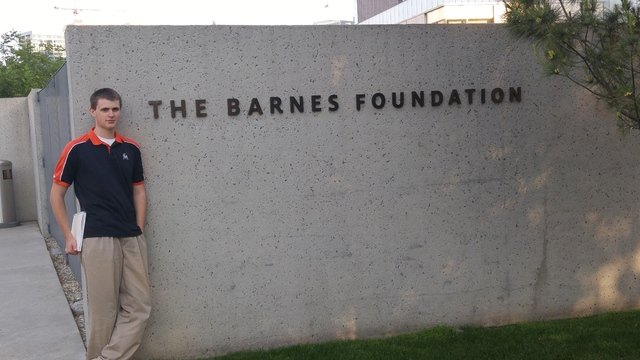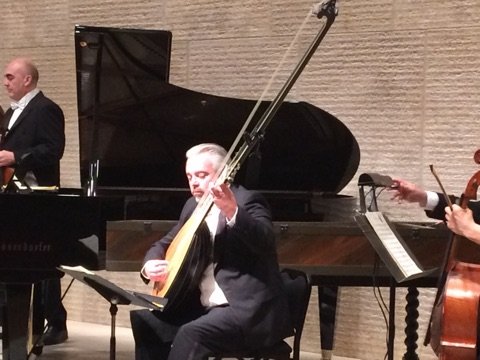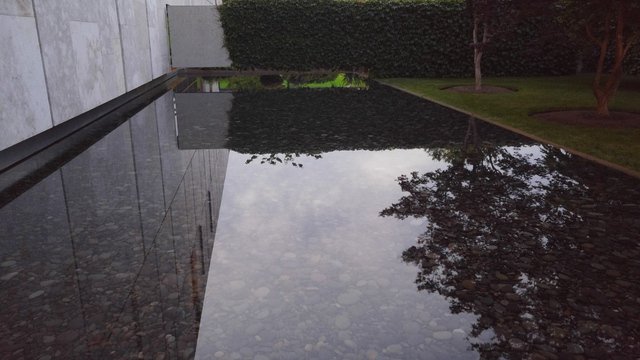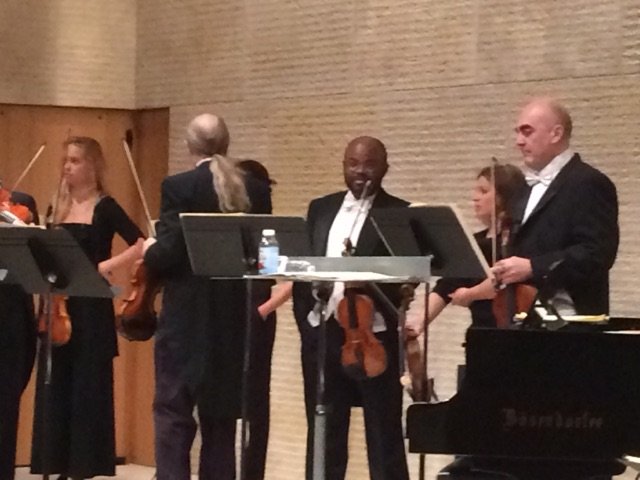
According to their website, "Vox Ama Deus specializes in the historically informed performance of High Renaissance, Baroque and Classical period music for voice and/or instruments." They specialize in music ranging from the years 1500 through 1825. Their conductor, who founded the group in 1987, is Romanian born, Julliard trained, pianist, conductor, and organist Dr. Valentin Radu. The show I saw featured soloists, Thomas DiSarlo (Violin), and Sarah Davol (Oboe)
The performance I saw was hosted by the Barnes Foundation in Philadelphia. Here are my thoughts:
First Piece - An Overture by German composer Christoph Willibald Gluck

This piece was a great opener. It was short and exhilarating! At first, I thought the strings sounded slightly out of tune, but as they performed, they fixed their intonation relatively quickly. I'd also like to mention that this performance was my first time seeing a theorbo (pictured to the left), which added a new dimension that I hadn't heard before).
Second Piece - Oboe Concerto in D Minor by Italian composer Tomaso Albinoni
This piece was the first to feature Ms. Davol as a soloist. She was very assertive as a soloist, as a soloist should be. This was my first time seeing a live oboe solo by a professional. I found that the oboe as a solo instrument has great clarity and a definitive sound. Also, the ensemble did an excellent job at backing off at the points where Ms. Davol was playing the main theme, and asserting themselves again for interludes. Overall, I found the themes played by the Oboe in this concerto to be very catchy, and well prepared.
Third Piece - Summer by Italian composer Antonio Vivaldi

Fourth Piece - Double Oboe and Violin Concerto in C Minor by German composer Johann Sebastian Bach

This concerto was originally written for two harpsichords, I believe, but I think that the substitution of Oboe and Violin was a wise substitution. This featured both of the previously mentioned soloists, at the same time. It was almost a finale to the middle of the show, bringing up both of the soloists who had played nicely, to showcase their talents once more. The beginning was fantastic, the accompaniment did a nice job at presenting the soloists while still asserting their parts. I thought the harpsichord could have been a bit softer, but it really was not that obvious. It is interesting to have heard this version of this concerto before actually hearing the version with Harpsichord soloists. Listening to the harpsichord version, the harpsichord actually adds a bit of intensity to the piece, which is really cool in the first and third movement. But in the second movement, I think the oboe and violin have a more tender and sweet sound. At some parts in the first movement, I felt Mr. DiSarlo played a bit too loud, causing him to drown out the oboe. In the second movement, as I stated before, the violin and oboe (oboe especially) provide a beautiful melodic structure (especially with Ms. Davol as the oboist). Again, I thought that the Cellist was playing a bit too loud, considering that the oboe should be dominant in this movement, but as time progressed, the cellist's dynamics adapted to allow the oboe to prevail. In the third movement, I thought the harpsichordist played her part really well. It sounded really cool. Also, I noticed that the bass does a really nice job at playing a counter melody to what the soloists play. I heard about four separate melodies going at once, and the cool part was that I couldn't distinguish dominance in any of the parts. They all sounded equally as important. The third movement was probably my favorite!
Fifth and Final Piece - Piano Concerto in D Minor by German Composer Johann Sebastian Bach

I was a little disappointed that they used a piano for this piece rather than a harpsichord. I feel that the harpsichord adds a level that a piano can't. At first, I thought the pianist, Maestro Valentin Radu, was hitting wrong notes, but I now realize that they sounded wrong to me because I had never heard it on piano before. The maestro did an excellent job at playing this piece, although I thought he could have played a bit softer on the second movement. Something I'd like to give the maestro credit for is that he was playing piano rather than conducting, meaning that he really had to work to keep the ensemble in time with himself. This is one of my favorite Bach pieces, due to its fast and energetic first and third movements. As stated by maestro Radu, the piano wasn't specifically popular when Bach wrote these pieces (1738-1739). I have included this piece on several lists. It really added a whole new dimension to this piece for me after seeing it played live.
Thanks for reading this! It was very interesting to see professionals some of my favorite Baroque pieces. Make sure to check out Vox Ama Deus, here is their schedule. Make sure to comment and check back later!

Also remember to check for: My weekly 7 post, As Well As My Composer Birthday Posts
